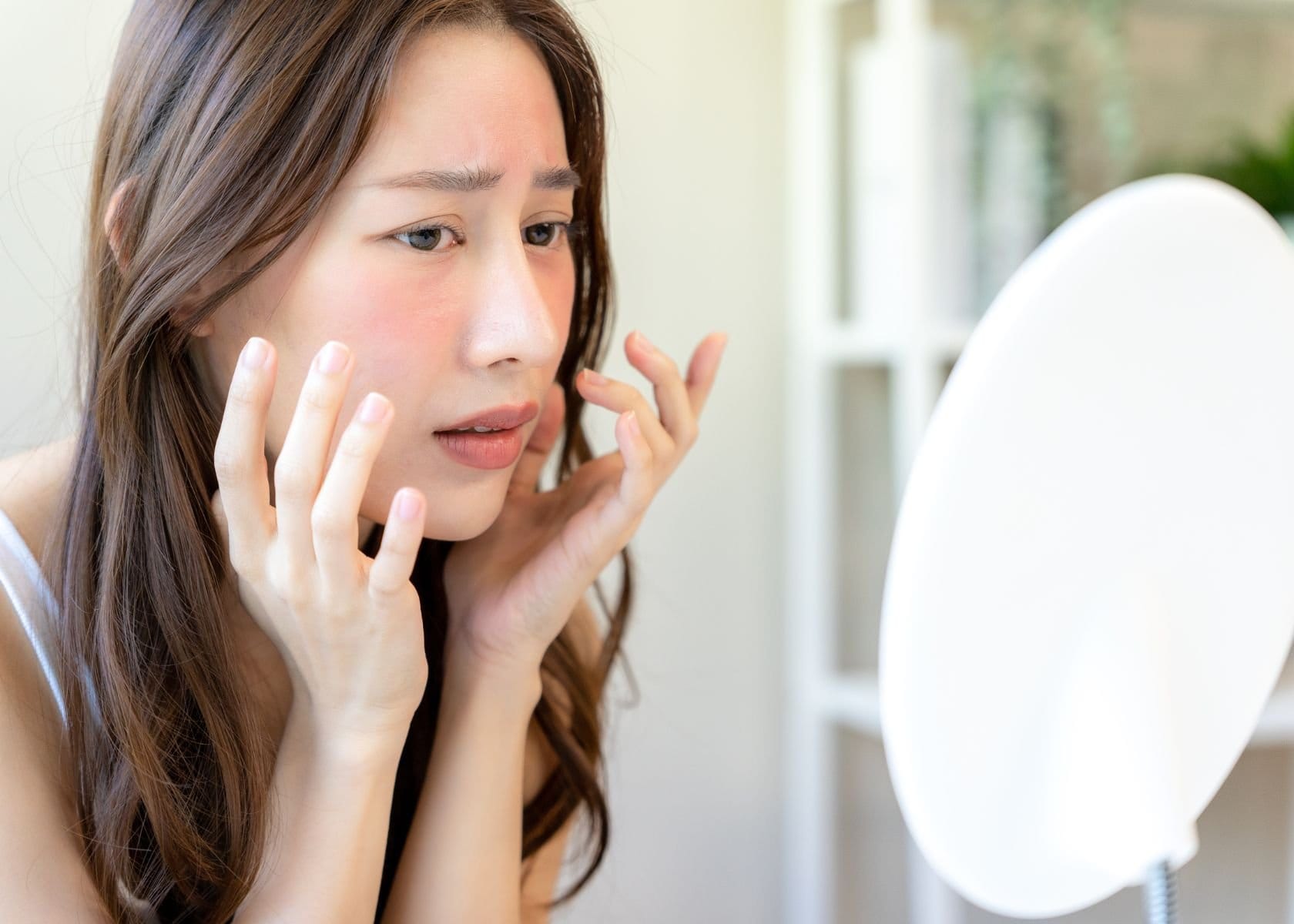Skincare is a daily ritual for many, and toners play a key role in keeping your skin hydrated. A toner is meant to cleanse your skin further after washing, getting rid of any leftover impurities while also balancing its pH level.
Feeling burned or stung could mean the product doesn't suit your skin type—or there might be too much alcohol or acid among the ingredients. Before you put any new toner on your whole face, try a patch test to avoid an unpleasant reaction.
If your skin does react badly with burning sensations, it's wise to stop using the product and seek advice from a dermatologist.
Stay tuned as we dive into everything about choosing and using facial toner correctly—your guide for healthy-looking skin awaits!
- Toners should not cause a burning sensation; if they do, it can be due to harsh ingredients like alcohol or acids, which may irritate sensitive skin.
- Choosing the right toner involves looking for gentle, alcohol-free options and considering your skin type and any potential allergies you might have.
- Proper use includes applying toner with a cotton pad once or twice daily after cleansing but avoiding overuse to prevent irritation.
- To minimize risks of adverse reactions, conduct patch tests regularly before using new toners and consult a dermatologist if burning occurs.
- Benefits of using toner include removing residual impurities, balancing the skin's pH level, aiding in product absorption, and preparing the skin for subsequent skincare products.
Role of Toner in Skincare

After understanding what toner is and its various types, it's essential to grasp the role of toner in skincare. Toner acts as a crucial step in your skincare routine by balancing the pH level of your oily skin and preparing it for better absorption of subsequent products.
This helps to remove any residual impurities after cleansing, leaving the skin refreshed and revitalized.
Furthermore, toner aids in replenishing moisture and nutrients while shrinking the appearance of pores. It also assists in restoring the skin's natural barrier function, ensuring that other skincare products are more effective.
Is Toner Supposed to Burn?

Toner is not supposed to burn, but some people may experience a tingling or stinging sensation when using it. When a toner burns, this can be due to the acid content in toner or other ingredients that may cause irritation for certain skin types. Moreover, it may be because of other skin concerns.
Reasons for Burning Sensations
Toner can cause burning sensations due to the presence of ingredients that may irritate sensitive skin, such as alcohol, acids, or fragrances.
- Harsh chemicals like alcohol in toner can strip away the skin's natural oils, leading to a burning sensation or skin irritation.
- Acids like salicylic acid or glycolic acid present in some toners can cause a tingling or stinging sensation on the skin.
- Fragrances in toner can also lead to irritation and burning sensations for those with sensitive skin.
- Allergic reactions to specific ingredients in toner can cause redness, inflammation, and a burning feeling on the skin.
Severity of Burning
Facial toner may cause a burning sensation due to sensitive skin reacting to certain ingredients. The severity of the burning can vary, from slight tingling to intense stinging, depending on the individual's skin sensitivity and the toner's formulation.
It's essential to be aware of your skin type and any allergies when choosing a toner, as some formulas with high alcohol content or acid percentages may cause more severe burning sensations.
When experiencing discomfort from a toner, discontinue use immediately and consult a dermatologist for guidance on alternative products that are better suited for your skin type. Understanding the severity of burning caused by toner can help in making informed decisions about skincare products tailored to individual needs.
How to Choose the Right Toner?

Choose a toner with minimal alcohol content and avoid ingredients like fragrance or artificial dyes, especially if you have sensitive skin. Consider your skin type and potential allergies when selecting the right toner for your skincare routine.
Ingredients to Avoid
Avoid toners containing high levels of alcohol, as they can cause a burning sensation on sensitive skin.
When choosing a toner, it is crucial to be mindful of potential allergens and sensitivities. Reading product labels and understanding your skin's tolerance for certain ingredients can help prevent adverse reactions.
Common allergens such as fragrance, alcohol, and certain acids should be avoided if you have sensitive skin. Conducting a patch test before integrating a new toner into your skincare routine can help identify any potential allergic reactions and ensure the product is suitable for your skin type.
Skin Type Considerations
When choosing a toner, it's essential to consider your skin type. For oily or acne-prone skin, opt for an alcohol-free toner with ingredients like salicylic acid to control excess oil and minimize breakouts.
Dry or sensitive skin types should look for hydrating and soothing ingredients such as hyaluronic acid, glycerin, or chamomile extract to nourish and calm the skin without causing irritation.
Combination skin can benefit from a gentle toner that balances the different areas of the face without stripping moisture. Understanding your skin type is crucial in selecting a toner that complements your skincare routine while addressing specific concerns.
It’s important not only to identify your skin type but also to be mindful of any allergies or sensitivities when choosing a toner. Individuals with sensitive skin should steer clear of potential irritants like alcohol, fragrances, and certain acids that can trigger redness or burning sensations.
Benefits of Using Toner

Reinforcing facial cleanser, helping with product absorption, and balancing skin's pH are just a few of the benefits of using toner. Incorporating toner into your skincare routine can help improve the overall health and appearance of your skin.
Reinforces Facial Cleanser
Using a toner after cleansing reinforces the effectiveness of your facial cleanser by removing any remaining impurities, oil, or makeup from the skin. This step ensures that your skin is thoroughly clean and ready to benefit from the other skincare products you apply afterward.
By completing the cleansing process with toner, you can maintain balanced and clarified skin while preparing it to absorb serums, moisturizers, and treatments more effectively.
The use of a toner post-cleansing also aids in restoring the skin's natural pH balance. This helps to keep your skin healthy and less prone to irritation or breakouts. Additionally, using a hydrating toner boosts moisture levels in the skin due to its humectant properties, keeping your complexion hydrated without being too heavy or occlusive.
Helps with Product Absorption
Toner helps with product absorption by preparing the skin to better receive the benefits of subsequent skincare products. By removing any residual impurities and balancing the skin's pH, toner creates a clean canvas for serums and moisturizers to penetrate deeply into the skin.
This can enhance the effectiveness of your skincare routine and ensure that your skin receives maximum nourishment from your other products.
Properly prepped skin allows for better penetration of active ingredients in subsequent skincare products, enabling them to work more effectively.
Balances Skin's pH
To maintain healthy and radiant skin, it's essential to use a toner that balances your skin's pH level. When the skin's natural pH is disrupted, it can lead to problems such as dryness, irritation, and breakouts.
A well-formulated toner works by restoring the skin's pH balance after cleansing, helping to keep the protective barrier intact. This not only promotes overall skin health but also prepares the skin for better absorption of moisturizers and other skincare products.
By incorporating a toner into your skincare routine that balances the pH of your skin, you can effectively minimize potential issues such as redness or discomfort caused by an imbalance in the body’s natural oils.
Proper Use of Toner

Apply toner to a clean face using a cotton pad, avoiding the eye area, and pat it onto your skin; for more on proper toner use and how to avoid burning sensations, keep reading.
Application Techniques
When applying toner, pour a small amount onto a cotton pad and gently swipe it across your face and neck. Avoid rubbing the toner into your skin, as this can cause unnecessary irritation.
It's important to wait for the toner to fully dry before applying any other skincare products to ensure maximum absorption. For those with sensitive skin, consider using a misting spray bottle for gentle application or even patting the toner onto your skin with clean hands.
To avoid potential irritation, be mindful of the frequency of use - once or twice daily is typically sufficient. If you notice any redness, burning sensation, or discomfort after application, discontinue use immediately and consult a dermatologist.
Frequency of Use
Use toner once or twice daily, depending on your skin type and the specific toner formula. Those with oily or acne-prone skin may benefit from using toner more frequently, while those with dry or sensitive skin might find that once a day is sufficient.
It's essential to monitor how your skin responds to the frequency of use, as overuse can lead to irritation for some individuals. Experimenting with different frequencies of use will help you determine what works best for your unique skincare needs.
Consider patch-testing a new toner before using it regularly on your entire face. This simple step can help identify any potential adverse reactions and allow you to adjust the frequency of application accordingly.
Potential Side Effects
Using toner regularly can have numerous benefits for your skin, but it's important to be aware of the potential side effects as well. Some individuals may experience redness, irritation, or a burning sensation when using certain toners, particularly if they contain ingredients that their skin is sensitive to.
This discomfort could also be linked to a high acid percentage in the toner. While formulas have become milder over time, some products still include low levels of potentially irritating substances like alcohol and fragrances that can cause stinging or burning sensations on the skin.
It's crucial to pay attention to how your skin reacts after applying toner and discontinue use if you experience any adverse effects. Patch testing a new toner on a small area before incorporating it into your skincare routine can help identify any potential reactions.
Is Toner Supposed to Burn - FAQs
Skin toner is a popular skincare product used to cleanse, refresh, and restore skin after cleansing. It often contains ingredients like witch hazel, glycolic acid, or rose water. Many people have questions about how to use toner properly and if there are any risks or side effects.
In this skin toner FAQ, we address some of the most frequently asked questions about using toner, including if it's supposed to burn or sting when you apply it.
Should applying facial toner cause burning?
No, a well-formulated facial toner should not burn; however, some tingling or stinging may happen if it contains certain acids or if you have sensitive skin.
What does it mean if my skin burns when I use toner?
If your skin burns after using toner, you might be experiencing a reaction to the product's ingredients or acid percentage. It could also indicate that the toner is too harsh for your skin type.
Can the way I apply toner reduce irritation?
Yes, proper toner application techniques can minimize irritation. Use gentle patting motions instead of rubbing and avoid overuse, which can lead to increased sensitivity and redness.
How do I choose a toner for sensitive skin without burning sensations?
Look for a facial toner specifically designed for sensitive skin with lower alcohol content and ideally free from irritating substances to avoid unpleasant burning sensations and reactions.
Is there a connection between alcohol in my skincare routine and my face feeling like it's on fire after using cosmetics like toners?
High alcohol content in cosmetics such as facial toners can strip away natural oils, leading to dryness, irritation, and sometimes an uncomfortable burning sensation during your skincare routine.
Conclusion
The burning sensation caused by toner can be attributed to specific skin sensitivities and ingredients present in the product. Understanding your skin type and avoiding irritating ingredients can help prevent discomfort from using toner.
Patch testing new toners before full application is a practical way to avoid unpleasant reactions and maximize skincare benefits.
Have you considered consulting a dermatologist if you experience burning sensations from using a toner? Let us know in the comments below.
Read More About Skin Toners





